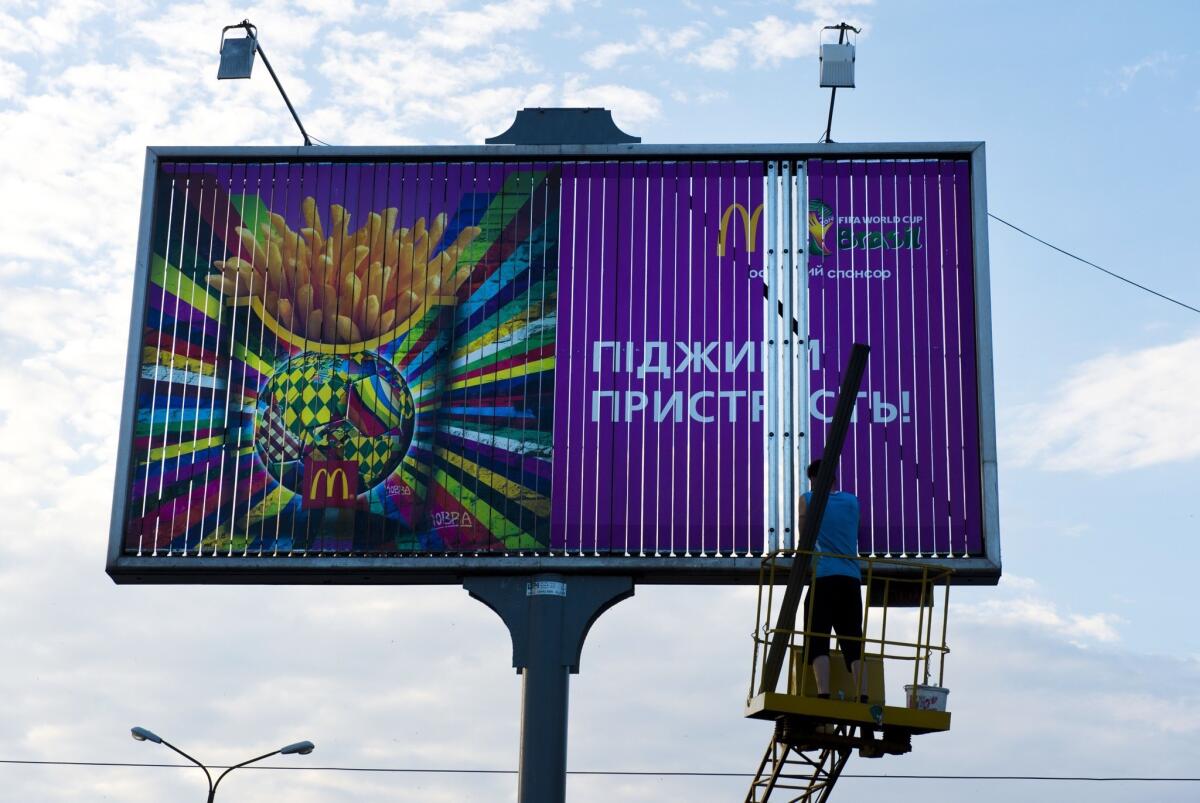Not lovin’ it in Russia: McDonald’s, Wendy’s in Kremlin’s cross hairs

- Share via
Two of the United States’ biggest burger chains have become the latest targets of Kremlin wrath, with McDonald’s fast-food offerings under the political microscope for alleged impurities and Wendy’s driven out of Russia altogether by deteriorating collaboration with the host country.
The undeclared war on the American cheeseburger follows a two-year pattern of proxy swipes against U.S. businesses and interests in Russia, including a ban last year on American adoptions of Russian orphans and demonizing of U.S. aid organizations and pro-democracy consultancies.
U.S.-Russian relations have been strained since President Vladimir Putin returned to power in 2012 and continued the systematic dismantling of independent media and opposition political parties begun during his first two terms in office. Russia’s seizure of Ukraine’s Crimean peninsula in February and Russian backing to separatist gunmen in eastern Ukraine have further driven the former superpower relationship to a level of hostility not seen since the Cold War.
McDonald’s was hit with a lawsuit last week by food regulators in the northern city of Novgorod who alleged the fast-food giant had misrepresented the fat content and nutritional values of its cheeseburgers, Filet-O-Fish sandwiches and shakes. On Monday, the federal agency responsible for monitoring food quality said it had begun a probe of whether cheese imported by McDonald’s for its 430 Russian outlets contained impermissible antibiotics, the Itar-Tass news agency reported.
Russia Today television reported that the investigation was focused on reports that cheese imported to Russia by McDonald’s from Germany and the Czech Republic contained natamycin, an antibiotic approved by the U.S. Department of Agriculture to prevent mold and yeast growth in pre-sliced and shredded cheese.
“Should we reveal anything, we will be considering relevant measures,” Sergei Dankvert, head of the food safety agency Rosselkhoznadzor, was quoted as telling the Russian news agencies. He was likely intimating that any McDonald’s franchises found to be serving foods with cheese containing antibiotics would be closed down or the food items stricken from the menu.
The Russia-wide investigation into the purity of McDonald’s menu items was prompted by “a great number of complaints,” Rosselkhoznadzor spokesman Alexei Alexeyenko told Russia Today.
In a response posted on its Russian website, McDonald’s said it had received no complaints about its food offerings and that the nutritional information was calculated according to Russian government practices, Russia Today reported.
McDonald’s, which has been wildly popular among Russians since the first franchise opened in central Moscow in 1990, was the target of a boycott called in April by Russian nationalist politician Vladimir Zhirinovsky after the chain closed its three franchises in Crimea. McDonald’s cited supply concerns as the reason for shuttering the outlets, an indirect reference to the Russian military takeover of the Ukrainian Black Sea region and its annexation by Russia two weeks later.
Also, on Monday, Wendy’s Co., the No. 3 U.S. burger chain, announced that it was leaving the Russian market after three years because of apparent discord with its local partners.
Wendy’s Co. spokesman Bob Bertini said the Russian franchisee, Wenrus, “has not expressed interest in growing Wendy’s business in Russia, nor shown they have the resources to successfully operate the existing restaurants on a long-term basis.”
Bertini insisted, though, that Wendy’s decision to leave the Russian market “was totally unrelated to the current political situation.”
Wendy’s agreed to open 180 franchises across Russia when the company teamed with an offshoot of Moscow’s Food Service Capital group in 2010 but had managed to bring only eight outlets on line before deciding to leave the market.
Burger bashing wouldn’t be the first instance of Russia using its food safety agency as a cudgel against countries with which it is in dispute. Moscow banned imports of Georgian wine in 2008 when the former Soviet republic was pursuing ties with the European Union and North Atlantic Treaty Organization. Food purity concerns were also cited last year when Russia barred imports of dairy products and chocolates from Ukraine when that country was negotiating an EU association agreement.
Follow @cjwilliamslat for the latest international news 24/7
More to Read
Sign up for Essential California
The most important California stories and recommendations in your inbox every morning.
You may occasionally receive promotional content from the Los Angeles Times.














